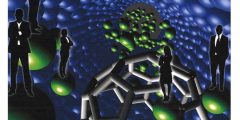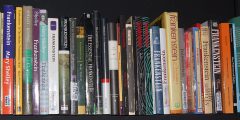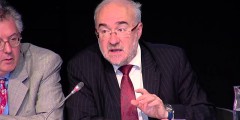Symmetry as false balance? Questions for STS
March 12, 2021
I am not getting involved in the Richard Dawkins tweet debate about whether ‘science’ is a social construct or not. However, seeing the debate flow past me on Twitter triggered a stream of thoughts which I’ll summarise in this blog post – about STS, the symmetry principle, false balance, and how to find ways to …
Is STS trivial? Chris Toumey reflects on writing a book about nanotech and the humanities
February 15, 2019
This is a guest post by Chris Toumey, a cultural anthropologist who has observed and studied developments in nanotechnology for many years. Chris and I have known each other for a long time, and his work and words have always inspired me. He has just published a book entitled Nanotech and the Humanities: An Anthropologist …
The social construction of science: What does it mean?
October 30, 2018
40 years ago science was still carried out in an ivory tower, scientists were highly respected bearers of truth and certainty and labs were mysterious and closed spaces.* Then came along some young and enterprising social scientists and showed that scientists are human, labs are places of messy human practices and science is fallible. Science …
Frankenstein is about US not STEM
January 19, 2018
I was reading my tweets the other day and came across this one: “I am reading the octopus book. My main hobby now is looking up from the octopus book in order to share octofacts.” This is popular science (communication) at its best.* It also made me think. If readers of Mary Shelley’s Frankenstein (1818) had …
Promises, promises, promises
December 28, 2017
It all started with this tweet – a conversation between Oliver Morton, Jack Stilgoe and David Keith about the hopes and fears related to geoengineering. In this conversation, they stumbled against the words ‘promise’ and ‘promising’, with Oliver and Keith interpreting them in terms of ordinary language use, while Jack interpreted them also in terms …
Improving climate change communications: moving beyond scientific certainty
June 8, 2015
This is a co-authored post with Gregory Hollin. It is based upon our new paper in Nature Climate Change, which is the first piece of original research from science and technology studies (STS) published in the journal. In the last 25 years scientists have become increasingly certain that humans are responsible for changes to the …
STS Concepts
April 26, 2015
For many years I have been working alongside a number of eminent Science and Technology Studies researchers. During that time I have come across many concepts that at first baffled me, then intrigued me and then prompted me to dig into their conceptual history. This blog provided me with a good space to engage in …
You say regulatory science, I say mandated science; let’s call the whole thing off?
July 2, 2014
One issue of contention after the Circling the Square conference was the apparent confounding of science with regulatory science. I finally took a bit of time to dig into the history and use of the concept of ‘regulatory science’ and a related concept, ‘mandated science’. I should stress that there are whole courses on ‘regulatory …
CALL FOR PAPERS, EASST 2014 – Solidarity and plurality: dimensions of ‘the public’ in scientific engagement
March 5, 2014
We warmly invite papers to our Making Science Public panel Solidarity and plurality: dimensions of ‘the public’ in scientific engagement, being held at the European Association for the Study of Science and Technology (EASST) conference in Toruń, the birthplace of Copernicus, on September 17-19. The panel is co-chaired by Stevienna De Saille and Warren Pearce (Making Science Public Research Fellows). The full call for papers is …
Mike Hulme: What Do Citizens and Scientists Expect of Each Other?
November 7, 2013
This is a guest post by Mike Hulme, Professor of Climate and Culture at King’s College, London: Over the last couple of weeks I have found myself in three very different settings in which challenging questions have been asked about the relationship between scientific knowledge and personal belief and social behaviour. Each time this has …










